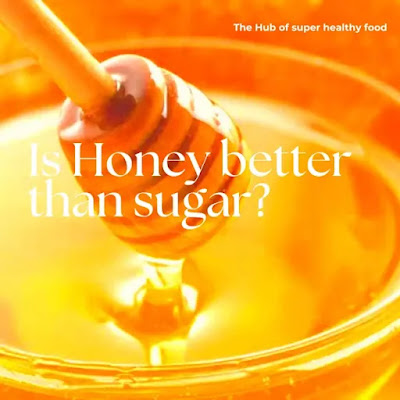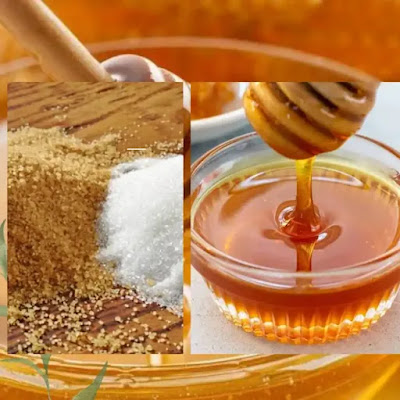Is honey better than sugar for you?
 |
Is honey healthier than sugar? |
Honey and sugar
are the two carbs made basically out of glucose and fructose. They're utilized
as fixings in many bundled food varieties and recipes. Both can add to weight
gain whenever abused.
Honey and sugar both give pleasantness, whether for
treats or cakes or a straightforward cup of tea. Yet, honey is frequently
viewed just as a better choice.
All of this
makes one wonder: Would it be a good idea for you to track down other, possibly
better ways of improving your food and beverages other than straight sugar?
What's more, is honey a better choice? This is the thing you want to be aware of.
In this article, you should get in deep knowledge about the basics of sugar and
honey.
What is honey?
Honey is the rich sugar nectar gathered by honeybees. This thick
substance is normally drunk in a fluid structure and can go in a variety from light
yellow to dim brown.
A large number
of the cell reinforcements found in honey are named flavonoids. Flavonoids have
mitigating properties, which might give some medical advantages.
Honey is made
basically made out of generally 38% fructose, 31% glucose, 17% water, and 7%
maltose, notwithstanding modest quantities of other straightforward starches, and dust. It additionally contains follow measures:
·
catalysts
·
amino
acids
·
B
nutrients
·
L-ascorbic
acid
·
minerals
·
cancer
prevention agents
Types:
There are north
of 300 assortments of honey accessible, with each starting from an alternate
flower source or a mix of a few. Each type is normally named after the nectar
source, which impacts the flavour and variety. The following are the most famous
assortments of honey available:
1. Buckwheat honey isn't as sweet and is hazier in
variety than different assortments yet has been demonstrated to be wealthy in
cancer prevention agents.
2. Acacia honey is light in variety and flavour with
gently fruity-botanical notes.
3. Wildflower
honey can differ in
flavour and variety from one season to another in light of the fact that the
honeybees have accumulated nectar from various bloom sources.
4. Clover is one of the most well-known assortments of honey, with a light
and sweet flavour and a solid botanical smell.
Benefits of honey:
As we know that
honey is higher in fructose than glucose. And fructose is a better option than
glucose, so you might have the opportunity to involve a more modest measure of honey
in your food or drink without forfeiting pleasantness.
Honey is more
nutriuos and less processed which gives extra nutrients to the body.
·
amino
acids
·
cell
reinforcements
·
catalysts
·
minerals
· nutrients
- At the point when utilized as a treatment in gel structure, it might assist with advancing mending of wounds and minor consumes.
- It might assist with facilitating hacking and sore throats.
- Honey might be more straightforward than sugar on the stomach-related framework. Because of its piece, ordinary sugar must be ingested prior to being separated. As honeybees add proteins to honey, the sugars are now somewhat separated, making it simpler to process.
- It might assist with killing off microbes since it has antimicrobial property
- Generally, honey goes through less handling than sugar does. It requires purification just to become table prepared. Honey can likewise be eaten crude.
Sugar:
Sugar, from sugarcane or sugar beets, is
comprised of monosaccharides; half fructose and half glucose, which bond
together to make the disaccharide sucrose, otherwise called sugar. It has no
additional nutrients or supplements.
It requires
multistep handling before it turns into the refined, granulated table sugar
that we utilize most frequently. Sugar is of many kinds of sugar, white,
brown, and crude sugar are the most usually utilized.
Earthy-coloured
sugar is a blend of white sugar and molasses and may have some following
supplements. It's utilized basically in baking.
Crude sugar is
a less-refined rendition of white sugar. It's light brown and contains more giant precious stones. Crude sugar doesn't change healthfully from white sugar. Different
kinds of sugar incorporate powdered, turbinado, and muscovado sugar.
Types:
The following
are five of the most well-known kinds of sugar available:
1. Granulated: A multipurpose sugar is profoundly
refined and most generally utilized in cooking and baking.
2. Light brown: It gives it a light earthy coloured
tone and a more extraordinary taste
3. Dim brown: Dull earthy-coloured sugar gives a
more extravagant flavour to recipes and has a higher grouping of molasses than
light earthy-coloured sugar.
4. Powdered: Also called confectioners' sugar,
powdered sugar has been ground down to a fine powder and has a limited quantity
of cornstarch included to forestall bunching.
Benefits and cons:
As a starch,
sugar is a likely wellspring of quick fuel. Your cerebrum needs 130 grams of
starch every day to work. This normally happening substance is likewise low in
calories, with a teaspoon containing around 16 calories. White sugar has a
long-time span of usability and is not difficult to use in baking and cooking.
Sugar is commonly minimal expense and effectively open.
We as a whole
realize that sugar ought to be delighted in with some restraint. An abundance
of sugar utilization (which can emerge out of pop, doughnuts, ketchup, and
salad dressings) can prompt constant irritation, glucose issues, and expanded
hazard of ailments including heftiness, Type 2 diabetes, and coronary illness.
High sugar admission has additionally been connected to poor psychological
wellness and wretchedness.
Differences:
 |
Sugar and honey |
1. Calories in Honey versus Sugar
Table sugar
contains more sugar per serving, it additionally contains more calories per
serving contrasted with honey. Per 100 grams, table sugar gives 387 calories,
while honey gives 304 calories. In any case, since honey is a fluid estimated by volume, it contains a larger number of calories than
sugar: one tablespoon of honey contains 63.8 calories, while one tablespoon of
sugar contains 46.5 calories.
2. Sugar Content in Honey versus Sugar
Table sugar contains somewhat a greater number of calories than honey. Per 100 grams, table sugar gives 100 grams of sugar, while honey gives 82.4 grams of sugar. This distinction is to a great extent because of the way that sugar is 100 per cent sucrose, while honey has higher water content.
3. Glycemic List of Honey versus Sugar
The glycemic record, or GI, of a food, demonstrates how rapidly or gradually it will raise glucose levels once eaten; the higher a food positions on the GI scale the more quickly it will increment glucose levels. Sugar positions higher on the glycemic file scale than honey, meaning it will raise glucose levels all the more rapidly. This is because of the greater convergence of fructose in sugar. Sugar positions at 65 on the glycemic list scale, while the specific glycemic positioning of honey differs on the grounds that the creation of honey can fluctuate, nonetheless, on normal honey positions at 61.
Conclusion:
From a calorie
and sugar content viewpoint, the distinctions between sugar and honey are
insignificant, in any case, in general, honey contains somewhat more medical
advantages than table sugar from its possible cell reinforcement,
antibacterial, antifungal, and mitigating properties.
Honey likewise
contains follow measures of B nutrients riboflavin, niacin, folic corrosive,
pantothenic corrosive, vitamin B6, L-ascorbic acid, and minerals calcium, iron,
zinc, potassium, phosphorous, magnesium, selenium, chromium, and manganese.
Notwithstanding,
it would require such enormous volumes of honey, and consequently sugar, to
acquire any huge measure of these minor elements that it would probably
discredit the additional advantages.
Comments
Post a Comment